Move away from coal softens, but stays alive in latest COP26 agreement
Andrew Freedman
Fri, November 12, 2021
GLASGOW, Scotland — An explicit effort to push the global economy away from coal and phase out fossil fuel subsidies has softened but remains alive in the latest draft COP26 summit agreement.
Why it matters: The careful language of the nonbinding agreement is meant as a critical global consensus on the scope of actions needed to prevent global warming's most dire harms.
Stay on top of the latest market trends and economic insights with Axios Markets. Subscribe for free
Where it stands: Friday morning brought revisions to the summit text ahead of fever pitch negotiations toward the end of COP26, which is scheduled to conclude within hours but will almost certainly bleed into the weekend.
Driving the news: The new language slightly tweaks the prior draft by now calling for countries to speed up the phaseout of "unabated" coal-fired power.
"Unabated" is a coded nod to the idea of using coal generation with carbon capture, even though that has yet to gain much real-world traction.
Meanwhile, it calls for phasing out "inefficient subsidies for fossil fuels," while the earlier draft didn't have the inefficient part.
The revised text is also more balanced between an emphasis on cutting emissions and providing more financial and technical assistance to developing countries in order to help them to better withstand climate impacts and compensate them for past damage.
The text pushes countries to revisit their emissions commitments by the end of 2022 and revisit 2030 targets throughout the 2020s.
It would also establish a "facility" on technical assistance for helping developing countries address damages already incurred by global warming, and calls for holding a workshop on loss and damage as well. In addition, it calls for a doubling of adaptation funding, to help countries withstand climate impacts going forward.
Yes, but: The latest draft does not go so far as to establish a standing fund for "loss and damage," a step the U.S. opposes, according to a State Department official in a briefing with reporters on Thursday.
What they're saying: "Friends, this is our collective moment for history," said COP president, U.K. politician Alok Sharma. "We must rise to the occasion."
The big picture: Outside and within the sprawling convention center where the negotiations are taking place, there is a sense of the high stakes involved as talks come down to the wire.
Protestors lined the streets outside, calling for climate justice and demanding a far-reaching agreement. Inside, weary negotiators mixed with others running from room to room, trying to settle key outstanding issues. Some slept on chairs.
Protestors from civil society groups marched through the building, shouting: "What do we want?" "Climate justice!" When do we want it?" "Now!"
Go deeper: What to know about COP26 in Glasgow
In Glasgow, nations miss deal deadline as disputes linger over coal and cash
By FRANK JORDANS, ANIRUDDHA GHOSAL and SETH BORENSTEIN
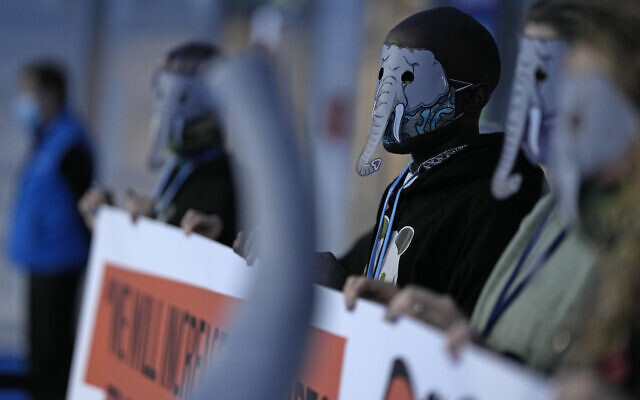
Protestors wear masks during a small demonstration inside the venue of the COP26 U.N. Climate Summit in Glasgow, Scotland, Friday, Nov. 12, 2021. (AP Photo/Alastair Grant)
GLASGOW, Scotland (AP) — Going into overtime Friday night, negotiators at UN climate talks in Glasgow were still trying to find common ground on phasing out coal, when nations need to update their emission-cutting pledges and, especially, on money.
Talks are at a “bit of a stalemate,” and the United States, with support from the European Union, is holding back talks, said Lee White, the Gabonese minister for forests and climate change.
Mohamed Adow of Power Shift Africa, a long-time talks observer, said poorer nations are beyond disappointed with the way the United Kingdom presidency has come up with drafts and that this has become “a rich world” negotiation. He said poorer nations cannot accept what has been proposed.
As the talks approached midnight, rich nations had a much more optimistic view, showing the split that might occur after new drafts appear Saturday.
United Kingdom Prime Minister Boris Johnson, host of the meeting, said through a spokesperson that he believes “an ambitious outcome is in sight.”
Get The Times of Israel's Daily Editionby email and never miss our top stories
Newsletter email addressGET IT
By signing up, you agree to the terms
US Climate Envoy John Kerry told The Associated Press on Friday night that climate talks were “working away,” commenting after a late night meeting with his Chinese counterpart and before a hallway chat with India’s minister.
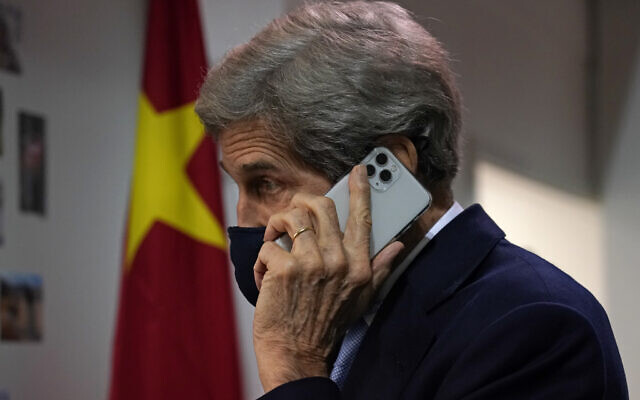
John Kerry, United States Special Presidential Envoy for Climate speaks on the phone outside the Chinese delegation office at the COP26 U.N. Climate Summit in Glasgow, Scotland, Friday, Nov. 12, 2021. Going into overtime, negotiators at U.N. climate talks in Glasgow are still trying to find common ground on phasing out coal, when nations need to update their emission-cutting pledges and, especially, on money. (AP Photo/Alberto Pezzali)
Chinese Climate Envoy Xie Zhenhua told Kerry in the hallway: “I think the current draft is more close” in a conversation that AP witnessed. When Kerry asked him if he felt better about it, Xie answered: “Yes, I feel better about it because Alok Sharma is a smart guy.”
No agreement was ready by the 6 p.m. local time scheduled end of the conference. And sometimes that helps diplomats get in a more deal-making mood.
“The negotiating culture is not to make the hard compromises until the meeting goes into extra innings, as we now have done,” said long-time climate talks observer Alden Meyer of the European think tank E3G. “But the UK presidency is still going to have to make a lot of people somewhat unhappy to get the comprehensive agreement we need out of Glasgow.”
Three sticking points were making people unhappy on Friday: cash, coal and timing.
A crunch issue is the question of financial aid for poor countries to cope with climate change. Rich nations failed to provide them with $100 billion annually by 2020, as agreed, causing considerable anger among developing countries going into the talks.
A Friday morning draft reflects those concerns, expressing “deep regret” that the $100 billion goal hasn’t been met and urging rich countries to scale up their funding for poor nations to reduce emissions and adapt to climate change — an issue with which developed countries are also grappling.
Poorer nations say regret isn’t enough.
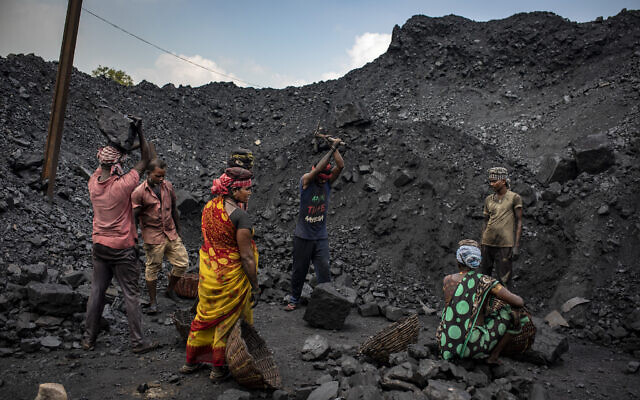
Laborers load coal onto trucks for transportation near Dhanbad, an eastern Indian city in Jharkhand state, Friday, Sept. 24, 2021. (AP Photo/Altaf Qadri)
“Don’t call them donor countries. They’re polluters. They owe this money,” said Saleemul Huq, a climate science and policy expert who is director of the International Centre for Climate Change and Development in Bangladesh.
The draft also proposes creating a loss-and-damage fund to help poor countries tap existing sources of aid when they face the devastating impacts of climate change. But rich nations such as the United States, which have historically been the biggest source of human-caused greenhouse gas emissions, are opposed to any legal obligation to compensate poor countries.
But Gabon’s White said rich countries, particularly the United States and the European Union, had said they weren’t ready. “They said we never agreed to that. It won’t work. It’s too complicated.”
The proposal for creating this mechanism is like creating a bank account, said Adow of Power Shift Africa. “We don’t need to push cash into the account now. It is just the opening of the account.”
This was the “elephant in the room,” said Lia Nicholson, lead negotiator for the alliance of small islands at the summit. She said that developing nations and China had a “united position” on this but the proposal hadn’t met with “significant pushback” from rich countries.
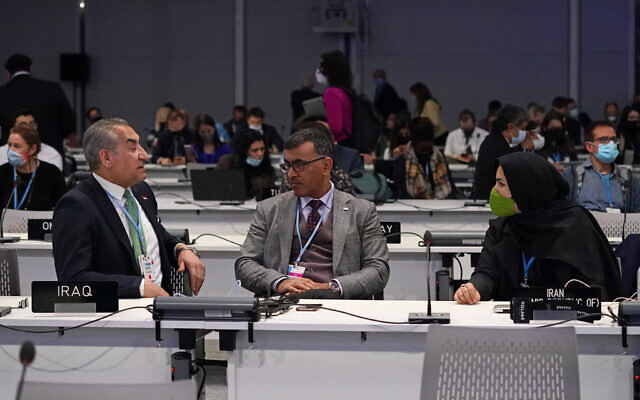
Delegates from Iraq and Iran chat before a plenary session at the COP26 U.N. Climate Summit in Glasgow, Scotland, Friday, Nov. 12, 2021. (AP Photo/Alberto Pezzali)
“Small islands can’t always be the ones who are asked to compromise our interest with the objectives of reaching consensus,” she said.
That Friday draft also called on countries to accelerate “the phaseout of unabated coal power and of inefficient subsidies for fossil fuels.”
A previous draft Wednesday had been stronger, calling on countries to “accelerate the phasing out of coal and subsidies for fossil fuel.”
Kerry said Washington backed the current wording. “We’re not talking about eliminating” coal, he told fellow climate diplomats. But, he said: “Those subsidies have to go.”
ADVERTISEMENT
Kerry said it was “a definition of insanity” that trillions were being spent to subsidize fossil fuels worldwide. “We’re allowing to feed the very problem we’re here to try to cure. It doesn’t make sense.”
But there was a mixed response from activists and observers on how significant the addition of the words “unabated” and “inefficient” was.
Richie Merzian, a former Australian climate negotiator who directs the climate and energy program at the Australia Institute think tank, said the additional caveats were “enough that you can run a coal train through it.”
Countries like Australia and India, the world’s third-biggest emitter, have resisted calls to phase out coal any time soon.
Scientists agree it is necessary to end the use of fossil fuels as soon as possible to meet the 2015 Paris accord’s ambitious goal of capping global warming at 1.5 degrees Celsius (2.7 Fahrenheit). But explicitly including such a call in the overarching declaration is politically sensitive, including for countries, such as Saudi Arabia, that fear oil and gas may be targeted next.
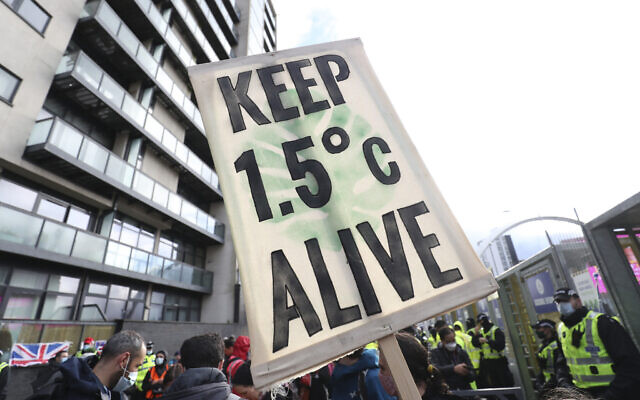
Climate activists take part in a demonstration outside the venue of the COP26 U.N. Climate Summit in Glasgow, Scotland, Friday, Nov. 12, 2021. (AP Photo/Scott Heppell)
Another issue from Friday morning’s draft concerns when nations have to come back with new emission-cutting targets which they were supposed to submit before the Glasgow talks. Because the pledges weren’t enough, the draft calls on the nations to submit another tougher target by the end of 2022, but some nations, such as Saudi Arabia, are balking about this said World Resources Institute’s David Waskow.
In 2015 in Paris, there was a debate about whether targets should be updated every five or 10 years so going to one year after Glasgow is a big deal, said Environmental Defense Fund Vice President Kelley Kizzier, a former EU negotiator.
Negotiators from almost 200 nations gathered in Glasgow on Oct. 31 amid dire warnings from leaders, activists and scientists that not enough is being done to curb global warming.
According to the proposed decision, countries plan to express “alarm and utmost concern” that human activities have already caused around 1.1C (2F) of global warming “and that impacts are already being felt in every region.”
While the Paris accord calls for limiting temperature to “well below” 2C (3.6F), ideally no more than 1.5C, by the end of the century compared to pre-industrial times, the draft agreement notes that the lower threshold “would significantly reduce the risks and impacts of climate change” and resolves to aim for that target.
In doing so, it calls for the world to cut carbon dioxide emission by 45% in 2030 compared with 2010 levels, and to add no additional CO2 to the atmosphere by mid-century. So far the world is not on track for that.
UN Secretary-General Antonio Guterres told The Associated Press this week that the 1.5C-goal “is still in reach but on life support.”
The annual meetings, first held in 1995 and only skipped once last year due to the pandemic, are designed to get all countries to gradually ratchet up their efforts to curb global warming.
But for many vulnerable nations the process has been far too slow.
“We need to deliver and take action now,” said Seve Paeniu, the finance minister of the Pacific island nation of Tuvalu. “It’s a matter of life and survival for many of us.”
COP26: Second draft agreement backs down on coal phaseout, fossil fuel subsidies
A second draft final text for the COP26 agreement was released in the early hours of 12 November, taking a step back from the prior draft on challenging the continued use of fossil fuels, but still exhorting developed countries to increase their climate finance commitments and speed up their emissions reductions.
The new draft retains the emphasis on reducing global CO2 emissions by 45% relative to 2010 by 2030 and that this requires an acceleration of deployment of clean energy technology and emissions reductions.
A deletion from the earlier draft language strengthens the commitment related to the ultimate goal of limiting global warming. The new draft states in Paragraph 20 that it: "Reaffirms the Paris Agreement temperature goal of holding the increase in the global average temperature to well below 2 degrees Celsius above pre-industrial levels and pursuing efforts to limit the temperature increase to 1.5 °C above pre-industrial levels."
The prior draft had the phrase "by 2100" at the end of that paragraph—and so removing the date can strike any implication that a higher temperature increase pre-2100 is acceptable.
However, the language related to coal and fossil fuels has been watered down. In draft two, the relevant section is Paragraph 36, which now: "Calls upon Parties to accelerate the development, deployment, and dissemination of technologies and the adoption of policies for the transition towards low-emission energy systems, including by rapidly scaling up clean power generation and accelerating the phaseout of unabated coal power and of inefficient subsidies for fossil fuels."
This can be interpreted as allowing for coal usage combined with carbon capture. The language referencing "inefficient subsidies for fossil fuels" opens new flexibility for the continued use of oil and, especially, natural gas.
One critic of the second draft, Jean Su, energy justice director at the Center for Biological Diversity, focused on those modifications. "The latest text out of Glasgow shows the oily imprints of fossil fuel influence," she said in a prepared statement. "The credibility of these talks is in question if landmark language around fossil fuels gives them a lifeline through carbon capture technologies and continued subsidies."
The second draft retains language from the earlier draft that would require countries to update their nationally determined contributions (NDCs) for reducing emissions by 2030 in time for COP27, scheduled for next November in Egypt. In the past, NDC updates were due every five years.
The US and China announced earlier in the week their intent to update their NDCs for COP27 as part of a framework to accelerate cooperation on methane and CO2 emissions reductions.
The second draft repeatedly uses terms such as "urgency" about the climate crisis and "serious concern" that impacts are getting more severe. It "urges developed country parties to urgently and significantly scale up their provision of climate finance, technology transfer and capacity building" for developing countries. The latter would include "significantly increasing" climate finance beyond the $100 billion per year that was promised under the Paris Agreement, but has yet to materialize.
Reaction
Reaction from nongovernmental organizations to draft two was negative, due to the weaker fossil fuel language, though they acknowledged it is the first time that a COP agreement would have any mention of reducing fossil fuel use.
"It could be better, it should be better," said Jennifer Morgan of Greenpeace International, in a tweet.
Speaking at a press conference at COP26 after the draft was released, Helen Mountford, vice president of climate and economics at the World Resources Institute, offered a mixed response. "The fact that we've got the phaseout of fossil fuel subsidies and the phaseout of coal in the text is really new and important," she said. "The fact that they've added in 'unabated' in front of coal and 'inefficient' in front of fossil fuel subsidies, compared to the text a couple of days ago, is definitely going back to some more comfortable negotiated language in other fora."
Arunabha Ghosh of the Climate Crisis Advisory Group, an organization of climate scientists based in New Delhi, India, agreed in a statement that the draft "continues to fall significantly short of the action needed to keep 1.5 degrees alive." But he said it does underscore the need for developed countries to both control their emissions and help the developing world, with the inclusion of language about "common but differentiated responsibilities" among nations.
That language about "differentiated responsibilities" is a two-edged sword. China and India, for example, have used that term in the past to argue that they will not be able to meet goals set out by other large carbon-emitting countries of net-zero economies by 2050, and will need one or two decades more to reach carbon neutrality.
Think-tank E3G took a more generous tone about the draft text, particularly the annual NDC updates. "The key paragraph on accelerating mitigation ambition is strengthened … [the] text requests parties to come back with more ambition by 2022," according to an analysis posted on its website.
The push for even more climate financing also comes through as a strong positive, E3G said. "Paragraph 27 of the COP text 'urges' developed countries to 'fully deliver' on the $100bn goal urgently and through to 2025. We'll be closely tracking reactions to this language," it said.
But E3G also suggested that the strong language about financing indicates that COP26 talks could be prolonged, if negotiators for individual countries need to ask their leaders to commit to more capital. "Leaders really have to decide if they want to keep 1.5 degrees Celsius alive now.… It's countries that must decide how much climate risk they will take," E3G said.
Next step
Most UN climate talks do not finish on time, and this event is likely to be no exception.
While COP26 is scheduled to conclude at 6 pm 12 November (Glasgow time), many observers expect the negotiations to last until 13 November at least. Countries still have yet to fully agree on climate finance, carbon trading rules (known as Article 6), plus loss and damage compensation for developing countries, among other matters.
"A small number of key issues remain, which require our urgent, urgent attention," COP26 President Alok Sharma admitted in an afternoon plenary on 12 November. "We simply did not have clarity [yet] on the way forward that would enjoy broad consensus."

THE COP26 SUMMIT
A climate summit theme: How much should wealthy countries pay to help poorer ones?

THE COP26 SUMMIT
For Brianna Fruean, the smell of mud drives home the need for climate action
The funds help vulnerable countries reduce their emissions with renewable energy and cleaner transportation, as well as help them prepare communities for climate impacts, like extreme storms and floods. The latest draft agreement expresses "deep regret" that richer countries so far have fallen short of that goal.
Several new funding commitments were announced in Glasgow, and wealthier countries say they'll reach the $100 billion mark in 2022 or 2023. But developing countries say much of that has been in the form of loans instead of grants, putting an added burden on nations to pay it back.
Developing countries estimate climate-related damage will hit $5-to-9 trillion by 2030 and are pushing for more details about what the next funding goal will be. They want to see more transparency about where climate finance is coming from, as well as assurances that much of it will be offered as grants.
"The level of ambition on climate finance required is simply not there yet," says Fekadu Beyene of Ethiopia, representing a group of the 46 poorest countries at the talks. "Vulnerable countries are already experiencing devastating impacts at 1.1 degrees Celsius of warming and are struggling to recover. We cannot expect to build resilience to the impacts we will feel at 1.5 degrees Celsius without additional resources."
Developing countries are also pushing for compensation for the increasing damage that climate change is already causing. They're seeking a dedicated "loss and damage" fund, which could be used by countries struggling to rebuild after disasters. Scotland announced the first contribution, 2 million pounds, at the Glasgow summit. But other wealthier countries, including the U.S., are wary of being held liable for climate change damages and oppose creating a separate fund.
Countries are headed toward "catastrophic climate change"
The modest progress made so far may be the best that can be expected from an international negotiation process where every country must agree on a final statement. But the scientific reality of a warming climate is unforgiving, and demands swifter action.
The group Climate Action Tracker earlier this week factored in new pledges countries had made so far to cut heat-trapping emissions. It found that even if everyone kept their most ambitious promises, warming would still be 1.8 degrees Celsius, which is above the 1.5 degree goal. When analysts mapped out what countries are actually doing now, the picture was bleaker.

THE COP26 SUMMIT
This is what the world looks like if we pass the crucial 1.5-degree climate threshold

THE COP26 SUMMIT
In Iraq's famed marshlands, climate change is upending a way of life
"With all the policies that are currently implemented, our temperature estimate is 2.7 degrees" of warming, said Niklas Höhne, founding partner of NewClimate Institute. "That is catastrophic climate change. It's a situation that we simply cannot handle."
Höhne was among those in Glasgow who said leaders must go back home and put practices in place to meet the promises they've made to each other.
In the U.S. President Biden has proposed an aggressive climate plan that aims to meet the goals of the Paris agreement, but much of the legislation needed to implement it is stalled in Congress



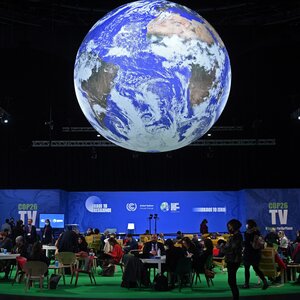



No comments:
Post a Comment